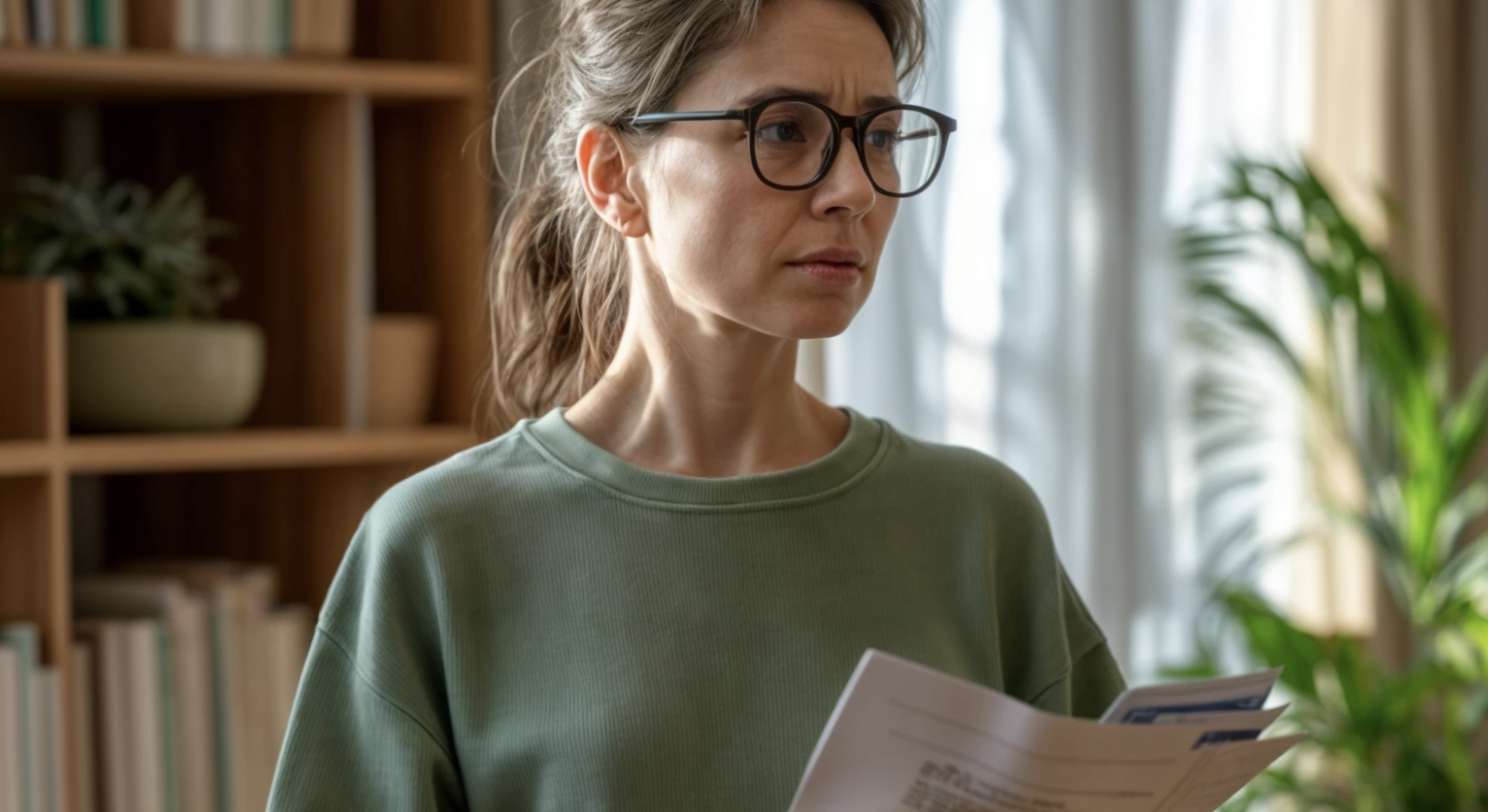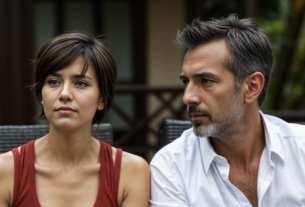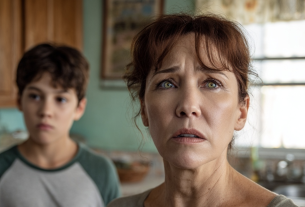Valentina stood in the middle of Yuri’s office, clutching a rag in her hands. The shelves, overloaded with old magazines, smelled of dust and something sour—like forgotten tea left in a cup. Tomorrow Yuri would turn sixty-six, and she had decided: it was time to tidy up his den. “There will be a surprise,” she thought, although a pang struck her chest.
For the last few years he had increasingly locked himself away in here, and she had grown used to not meddling. But today was a special case.
“Where do I start?” she muttered to herself, surveying the chaos. “This isn’t an office; it’s some kind of storage!”
She began with the bookcase, shifting yellowed reference books around. Then she reached the desk. The drawers opened with difficulty, creaking like old bones. In the top drawers there was nothing interesting—bills, receipts, a couple of pens without caps. But the bottom drawer resisted her efforts. Valentina pulled harder until—with a loud crack—it flew out, scattering a heap of papers onto the floor.
“God, Yuri, what are you hiding here?” she snorted while gathering the sheets. But her laughter caught in her throat when she spotted the top document: a bank transfer. The sum—one hundred thousand rubles. The recipient—a certain Irina Kovalyova. The date—three months ago. Valentina frowned. The name meant nothing to her. She sifted through the other papers: more transfers, all to the same Irina. And then—a letter. An old one, on thin paper with faded ink.
“Yuri, I know you didn’t mean for this to happen, but it’s yours. He’s had him for two years already. I’m not asking for much, just help.”
Valentina froze. Her hands trembled and the paper slipped from her grasp. She picked up another letter, then another. In each lay the same story: a woman, a child, pleas.
The last transfer was dated just last week. And at the bottom of it, a handwritten note: “For Sasha’s birthday, 10 years old.”
“Ten years old?” she whispered. “Which Sasha? What nonsense?”
She collapsed into a chair, feeling as though the floor were giving way beneath her. Fragments whirled in her mind: Yuri’s business trips, his excuses, his endless refrain of “don’t meddle, Valya, it’s my work.” She had always believed him. Always. And now before her lay a folder screaming that everything she knew about her husband was a lie.
“This is a mistake,” she said aloud, though her voice trembled. “He couldn’t do it. Not Yuri.”
She sat, staring at the papers, as darkness settled outside. A lump grew in her chest—whether from anger or fear, she couldn’t tell. She wanted to burn the sheets, but instead she neatly folded them back into the folder. Tomorrow she would ask questions. Directly. And for now—not a word. Just avoid crying.
That night Valentina couldn’t sleep. She lay staring at the ceiling while Yuri snored beside her. His familiar snoring now sounded foreign.
She recalled everything: how he had lingered “in meetings,” how he’d brushed off her questions, how once—about eight years ago—he returned from a trip with a look as if he’d lost something precious. Then she had thought: he was tired. Now it was all coming together like a puzzle she never wanted to see.
In the morning she was preparing breakfast, and her hands seemed to have a mind of their own—overpouring the coffee or dropping the bread. Yuri entered, grumbling a “good morning” while burying himself in his phone. Valentina looked at his bald head, the wrinkles by his eyes, and thought: “Who are you, anyway?”
“Yur,” she began, straining to keep her voice steady, “I was cleaning your office yesterday.”
He froze—the spoon with his porridge hovering in midair.
“Why?” he asked without looking up. “I told you not to touch anything.”
“It was meant to be a surprise,” she forced a smile. “I found some papers there. Strange ones.”
“What papers?” he finally looked at her, and something sharp flashed in his eyes like a blade.
“Transfers. To some Irina. And letters,” she paused, watching him carefully. “About a boy. Sasha.”
Yuri coughed and set his spoon aside. His face turned stony.
“Were you rummaging through my things?” his voice was low, laced with threat.
“I was cleaning, Yuri!” she exclaimed, unable to contain herself. “This is my home! And you… who are you? Who is this Irina? Who is this child?”
“Don’t shout,” he said, rising and pushing a chair aside. “It’s none of your business. A mistake. An old affair. Forget it.”
“A mistake?” she stepped closer, anger replacing fear. “Eight years of transfers—is that just a mistake? You have a son, Yuri? A son?!”
He was silent, staring at the floor. Then he said, almost in a whisper:
“I didn’t want you to know.”
Valentina recoiled as if struck. She had expected shouting, excuses—anything but this. Not this cold truth, tossed aside like a bone for a dog.
“How could you?” her voice cracked. “All these years… who was I to you? A servant? A fool?”
“Valya, enough,” he waved his hand dismissively, as if swatting away a fly. “Don’t dramatize. It changes nothing.”
“Changes nothing?” she laughed bitterly—a laugh as sharp as breaking glass. “You stole my life, Yuri. And now you say ‘it changes nothing’?”
She ran out of the kitchen, slamming the door behind her. In the bedroom, she collapsed onto the bed, burying her face in a pillow. No tears flowed—only emptiness. She didn’t know what to do. But she knew one thing: it couldn’t go on like this.
Valentina sat on the sofa, clutching her phone.
Her fingers trembled as she dialed Lena’s number. Her daughter answered immediately, her voice brisk with a hint of hoarseness—just as it always was after her morning coffee.
“Mom, why are you up so early? Is everything all right?”
“No, Lena, not all right,” Valentina swallowed hard. “Come over. Please.”
Within an hour Lena was at the door. Her hair was tousled; she carried a bag with keys and a bun she’d obviously grabbed along the way. Valentina embraced her, and then tears finally broke out—hot, heavy, like rain after a long drought.
“Mom, you’re scaring me,” Lena said, stepping back and looking at her face. “What happened?”
“Your father… has a son,” Valentina managed to say. “A ten-year-old boy. And a woman—some Irina. I found the papers.”
Lena froze, then slowly sank into a chair. Her usually open face became distant—a mixture of surprise and something else. Valentina braced herself for shouting, but her daughter only asked softly:
“Are you sure?”
“Sure?” Valentina snorted, and that sound was filled with pain so deep that Lena shuddered. “Transfers, letters, dates… He admitted it, at least partially. Said it was a mistake of youth.”
“Of youth?” Lena jumped up, eyes blazing. “He’s sixty-six, Mom! What youth? Did he decide in his fifties to take up a hobby?”
Valentina involuntarily smiled—a bitter, crooked smile. Lena always knew how to say what Valentina herself feared to voice. But her laughter quickly faded.
“I don’t know what to do,” she confessed. “Everything’s falling apart. I thought we were partners. And he… he didn’t even apologize.”
Lena approached and put her arms around her shoulders. The warmth of her daughter was the only thing keeping Valentina afloat.
“I suspected,” Lena suddenly said, and Valentina recoiled.
“What? You knew?”
“Not exactly,” Lena shook her head. “But I felt it. He’s become strange. Distant. Remember how he was late for my birthday? He said it was because of traffic, but I saw him arriving that day from another city. I didn’t tell you—I didn’t want to interfere.”
“Why did you stay silent?” Valentina asked, feeling a fresh lump in her chest.
“I was afraid,” Lena admitted, averting her gaze. “I thought I was mistaken. But now… Mom, you don’t have to put up with this.”
“And what should I do?” Valentina’s voice rose into a shout. “Forgive? Forget? Live with him knowing he betrayed me?”
“Leave,” Lena said quietly. “You deserve better.”
Those words hung in the air like the ringing toll of a bell. Valentina was silent. Leave? At sixty-two? After forty years of marriage? It sounded absurd. But the thought had already lodged itself in her mind like a splinter.
For two days Valentina moved like a shadow.
Yuri pretended nothing had happened: he ate breakfast, flipped through the newspaper, and retreated into his office. This infuriated her. How could he be so calm when her world was shattering? On the third day she decided.
“Yur, we need to talk,” she said, standing in the kitchen doorway.
He looked up from his plate and sighed.
“Again? I told you it’s none of your business.”
“None of my business?” she stepped forward, her voice trembling with anger. “You broke my life, and I’m supposed to stay silent? Who is she? Who is this child?”
Yuri leaned back in his chair, arms crossed.
“That was long ago, Valya. A mistake. I didn’t want to hurt you.”
“Didn’t want to hurt?” she scoffed, her laugh sharp as shattering glass. “You’ve been sending money for eight years! Eight years! Is that just a coincidence?”
“I had an obligation,” he raised his voice. “There’s a child. My child. I couldn’t just abandon him.”
“And what about me?” she thundered, slamming her fist onto the table so that the dishes clattered. “Me, who gave you everything? I quit my career for you, Yuri! And you… you lied to my face!”
He stood and walked to the window. A heavy silence settled, like wet snow.
“I didn’t want a divorce,” he finally said. “We can go back to the way things were.”
“Back to the way things were?” she looked at him, hardly believing her ears. “Seriously? After everything?”
“What do you want?” he turned, eyes challenging her. “To leave? At your age? Where would you go?”
Those words hit her like a slap. Valentina gasped. He regarded her with a slight smirk, as if she were a petulant child over a trifle. And in that moment, something snapped. She straightened up.
“I’m filing for divorce,” she said firmly. “Enough.”
Yuri paled.
“You won’t do that,” he shot back. “You’re nobody without me.”
“We’ll see,” she replied, turning and leaving with her heart pounding. For the first time in years, she wasn’t afraid of his words. For the first time, she knew what she wanted.
Later that day, Valentina sat in Lena’s room watching as her daughter packed her belongings into a suitcase. Outside, a gentle rain tapped at the window like impatient fingers. She had filed the divorce papers yesterday, and now every minute in that house felt like an eternity.
“Mom, are you really sure?” Lena raised her head, holding one of Valentina’s old sweaters. “It’s not too late to change your mind.”
“Change my mind?” Valentina smirked bitterly. “And what would I do? Sit at the same table with him, knowing he lied to my face? No, Lena. Enough.”
Lena nodded, carefully placing the sweater aside. Her movements were brisk, but worry shimmered in her eyes.
“And what about Dad?” she asked without looking up. “Is he silent?”
“Silent,” Valentina shrugged. “Yesterday he grumbled something about ‘don’t be stupid,’ and today it’s as if I don’t exist—locked away in his office as usual.”
“As usual,” Lena repeated sarcastically. “Of course. He’s a master at hiding. Even from himself.”
Valentina looked at her daughter and thought: how different she was from Yuri. Lena was lively, open, ready to fight for the truth, whereas Yuri was like an old safe—locked with countless combinations, his inner contents a mystery.
She remembered his words: “You’re nobody without me.” They still stung, though not as sharply. Perhaps he was right? Perhaps it was too late to change everything at sixty-two? But then she looked at Lena—and all doubt vanished.
“I’ll manage,” she said quietly, more for herself than for her daughter. “I’ll prove it to him. And to myself.”
Lena smiled, truly for the first time that day.
“That’s my mom,” she said. “I was afraid you were completely beaten.”
That evening, Yuri finally emerged from his office. Valentina stood by the stove, mechanically stirring soup. He coughed, as if seeking her attention.
“Valya,” he began, his voice uncharacteristically gentle. “Let’s talk. No shouting.”
She turned, gripping her spoon so tightly her knuckles whitened.
“About what?” she snapped. “About your Irina? Or about how you made a fool out of me?”
“I don’t want a divorce,” he stepped closer. “We’ve been together for forty years. Doesn’t that mean something?”
“Forty years?” she whipped around, her eyes flashing with disbelief. “I trusted you for forty years! And you? Where were you all these years? With whom?”
“I made a mistake,” he gestured theatrically, “but I’m still here. With you.”
“Here?” she laughed—a sharp, almost hysterical laugh. “You were handing me money under my nose for your Sasha! And I was darning your socks, thinking we were a family!”
He opened his mouth, but no words came. Then Valentina suddenly realized: he would never change. Never. And that simple thought brought her an odd relief.
“I’m going to Lena’s,” she stated. “And then—whatever the court decides.”
Yuri looked at her, and real fear flashed in his eyes. But Valentina had already turned away. She no longer cared.
The court hearing dragged on endlessly. Valentina sat on a wooden bench, clutching her purse, while the lawyer mumbled something about dividing property. Yuri sat opposite her in an old suit that she had once carefully pressed for him. He appeared smaller than usual—hunched over, his gaze dim. She found herself waiting for even a word or a glance from him. But he remained silent.
“Are you sure about your decision, Valentina Petrovna?” the judge asked, peering over his glasses.
“Sure,” she replied steadily. “I want a divorce.”
Suddenly Yuri stood. Everyone turned to him—even the lawyer fell silent.
“Valya,” he said, his voice breaking, “don’t do this. We can fix everything. I… I’m begging you.”
She looked at him long and hard, as if for the very first time. Fix it? After all this? She remembered the letters, the transfers, his cold “none of your business.” And suddenly she laughed—did he really think she was so weak that she’d run back as soon as he asked?
“Fix it?” she said, meeting his eyes. “And what exactly will you fix, Yuri? Time? Lies? Or your son—who is ten years old, and I only just learned about him yesterday?”
A heavy silence fell over the courtroom. The judge coughed, but Valentina continued undeterred.
“Do you think I’ll stay because I have nowhere else to go?” her voice grew louder. “Well, Yuri, I will find somewhere. And you—keep your truth. Live alone.”
She sat, feeling her hands tremble. Yuri slumped back down, his face growing pallid. The lawyer resumed speaking, but Valentina no longer listened. She knew: it was over.
When the hearing ended, she stepped outside. The rain had ceased, and the air smelled of dampness and freedom. She took a deep breath—and then Lena touched her shoulder.
“Mom, you’re amazing,” her daughter said. “I’m proud of you.”
Valentina smiled, though it was a crooked smile. She wasn’t yet used to the feeling—a mixture of pain and relief. They walked to the car, and suddenly she noticed a woman at the courthouse entrance. A young woman with dark hair. Next to her, a skinny boy with big eyes. He looked so much like Yuri in his youth that Valentina’s breath caught.
“Is that her?” Lena whispered, squeezing her hand.
“I don’t know,” Valentina replied, “and I don’t want to.”
She turned away and walked on. Let Yuri sort out his own mess. It no longer concerned her.
A week after the hearing, Valentina settled in a small rented apartment. The room smelled of fresh paint and a hint of mildew—an old building in a quiet neighborhood, far from the place where she had spent nearly her entire life.
There was scarcely any furniture: a bed, a table, a couple of chairs. A suitcase of belongings lay unpacked against the wall. She looked at the bare walls and thought: “This is my home now.” For the first time in forty years—it belonged solely to her.
“Mom, are you sure you don’t want to live with me?” Lena asked from the doorway, holding a box of dishes. “It feels so empty here.”
“Empty is good,” Valentina replied, gazing out the window. Outside, the branches of a poplar swayed, still wet after the rain. “I’ll fill it myself. In my own way.”
Lena set the box down and came over. Her face was serious, almost stern.
“Don’t you miss him?” she asked softly. “Are you sure you’re okay with leaving?”
Valentina hesitated. Did she miss him? There were nights when she reached out for the empty side of the bed. Minutes when she caught herself thinking, “What if he’s right? What if I can’t do this?” But then she recalled his cold eyes, his words “you’re nobody without me”—and those doubts melted away.
“No, Lena,” she finally said. “I only regret not leaving sooner.”
Lena nodded, as if expecting that answer. They silently unpacked her belongings: an old teapot, a few plates, a framed photo of Lena. Suddenly, Valentina stopped while holding a small porcelain figurine—a dancing girl. Yuri had given it to her on some anniversary. She had almost thrown it away, but then reconsidered. Let it remain. A reminder.
A few days later, Lena convinced her to enroll in a floral arrangement course. At first, Valentina dismissed it—“What use would I have for flowers at my age?” But her daughter persisted.
“Mom, you’ve always loved flowers,” Lena said. “Remember how you used to tend the flower beds at the summer house? Try it. It can’t be any worse.”
So Valentina went. On the first day, she sat among women much younger than herself, feeling out of place. But when she was handed a pair of scissors and some hydrangeas, something clicked. Her hands, so used to mending and cleaning, suddenly became alive. She made her first bouquet—clumsy, but full of life. The instructor, a slight woman with a keen gaze, praised her:
“You have talent, Valentina Petrovna. Your soul shows in your work.”
For the first time in months, Valentina truly smiled. Soul. Perhaps she was indeed still alive.
A month passed.
Valentina sat on the balcony of her small apartment, watching the sunset. In her hands—a cup of herbal tea; on the table—a freshly gathered bouquet of daisies and lavender. The courses had become her solace: three times a week she learned to weave wreaths, arrange compositions, and understand flowers. Her hands, calloused from years of housework, now smelled of green and earth. She even started earning a little money—a neighbor ordered a bouquet for her daughter’s wedding, and later another acquaintance asked her to decorate a table. Small earnings, but to Valentina they felt like a miracle.
Lena visited almost every day. Sometimes she brought food, sometimes news. According to Valentina, Yuri called a couple of times, trying to explain something, but Lena always cut the conversation short.
“He hasn’t changed, Mom,” Lena said one day in the kitchen. “He’s still the same—always thinking everyone else is at fault except him.”
“Let him think what he wants,” Valentina replied, stirring her soup. “I don’t care anymore.”
And that was the truth. Yuri had become like an old film to her—familiar, yet distant. She was no longer angry. No longer afraid. She simply lived.
Then, friends from her course invited her on a trip—to Italy, a week by the sea. At first, Valentina refused—too expensive, too frightening, and what would an old lady do there? But Lena insisted:
“Mom, you’ve been cooped up at home all your life. Go. You deserve it.”
And so she went. On the plane her heart pounded like that of a teenager, but when she stepped onto Italian soil, the fear melted away. The sea was as blue as in her dreams, and the air smelled of salt and flowers. She wandered through narrow alleys, ate ice cream, and laughed with her new friends over her clumsy attempts at Italian. For the first time in years, she felt light. Free.
Upon returning, she placed a postcard of Florence on the table. Beside it, a new bouquet. She looked at them and thought: “This is mine.” Not Yuri, not the old house, not the past. My life. My choice.
“I made it,” she whispered, as if testing the words, and smiled.



